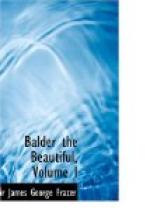which are stuck in the fields. Charred sticks
of the Judas fire, as it is popularly called, are
supposed to possess a magical and healing virtue;
hence the people take them home with them, and even
scuffle with each other for the still glowing embers
in order to carry them, still glimmering, to their
houses and so obtain “the light” or “the
holy light."[310] At Hildesheim, also, and the neighbouring
villages of central Germany rites both of fire and
water are or were till lately observed at Easter.
Thus on Easter night many people fetch water from
the Innerste river and keep it carefully, believing
it to be a remedy for many sorts of ailments both
of man and beast. In the villages on the Leine
river servant men and maids used to go silently on
Easter night between the hours of eleven and twelve
and silently draw water in buckets from the river;
they mixed the water with the fodder and the drink
of the cattle to make the animals thrive, and they
imagined that to wash in it was good for human beings.
Many were also of opinion that at the same mystic
hour the water turned to wine as far as the crowing
of a cock could be heard, and in this belief they laid
themselves flat on their stomachs and kept their tongues
in the water till the miraculous change occurred,
when they took a great gulp of the transformed water.
At Hildesheim, too, and the neighbouring villages
fires used to blaze on all the heights on Easter Eve;
and embers taken from the bonfires were dipped in
the cattle troughs to benefit the beasts and were
kept in the houses to avert lightning.[311]
[New fire at Easter in Carinthia; consecration of
fire and water by the Catholic Church at Easter.]
In the Lesachthal, Carinthia, all the fires in the
houses used to be extinguished on Easter Saturday,
and rekindled with a fresh fire brought from the churchyard,
where the priest had lit it by the friction of flint
and steel and had bestowed his blessing on it.[312]
Such customs were probably widespread. In a Latin
poem of the sixteenth century, written by a certain
Thomas Kirchmeyer and translated into English by Barnabe
Googe, we read:—
“On Easter Eve the fire all is quencht in
every place, And fresh againe from out the flint is
fetcht with solemne grace: The priest doth halow
this against great daungers many one, A brande whereof
doth every man with greedie mind take home, That when
the fearefull storme appeares, or tempest black arise,
By lighting this he safe may be from stroke of hurtful
skies: A taper great, the Paschall namde, with
musicke then they blesse, And franckensence herein
they pricke, for greater holynesse: This burneth
night and day as signe of Christ that conquerde hell,
As if so be this foolish toye suffiseth this to tell.
Then doth the Bishop or the Priest, the water halow
straight,
That for their baptisme is reservde: for now
no more of waight
Is that they usde the yeare before, nor can they any
more,
Yong children christen with the same, as they have




